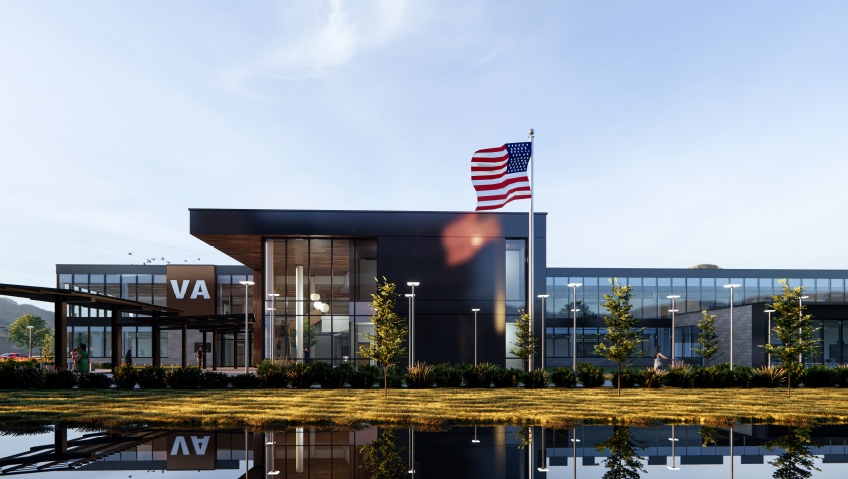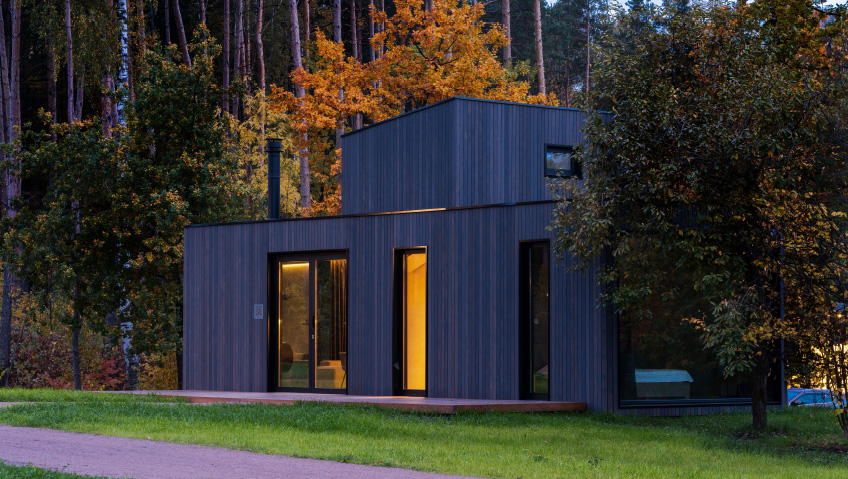Apogee Consulting Group, P.A. of Cary, North Carolina specializes in architecture, engineering, and excellent customer care. This service-disabled, veteran-owned, small business (SDVOSB) with a nationwide presence marked its 25th anniversary this year.
As a full-service architectural/engineering firm, Apogee offers architecture, planning, interiors, structural, electrical, and mechanical engineering, fire protection technology, cost estimating, project management, and construction administration. These in-house services are complemented by a commitment to collaboration and planning. Its architects, engineers, and other staff members work together, using information technology to exchange data, ideas, designs, and blueprints.
“A lot of architecture/engineering groups don’t have a fully integrated and collaborative approach. They have different silos… that ultimately generate competing interests,” explains Chief Operating Officer Josh VandenEnde. “We feel that fully integrating and combining our workflows and sequencing everything strategically throughout the project not only creates better value for the client, it helps ensure that all systems work together.”
Clearly, this approach is working, given that Apogee has grown “about 10 percent per year or better, nonstop,” for over a decade, according to Executive Vice President Ken Noel.
Apogee’s 106 employees work from offices in Charlotte, North Carolina; Murfreesboro, Tennessee; Indianapolis, Indiana; Minneapolis, Minnesota; Fort Collins, Colorado; and Las Vegas, Nevada, in addition to its headquarters. From these locations, the team takes on assignments in 44 states across the U.S.
At present, about 95 percent of the company’s revenue comes from healthcare-related projects with the U.S. Department of Veterans Affairs (VA). “For the majority of our 25 years, we have focused mainly on federal work. We do all different sectors of federal work, but our bread and butter is [for the] VA. We also do design for the Army Corps, Air Force, and the healthcare sector work,” says Chief of Design Services Erica Irvin.
Hospitals pose certain challenges for construction and renovation firms. Unlike, say, a shopping mall or office, hospitals need to be open around-the-clock. “They can’t just shut down the wing in most cases, so renovations have to be done around [medical staff] continuing to work,” notes Executive Vice President Charles Sowders. This is where construction phasing—another Apogee specialty—comes into play. Construction phasing breaks down construction work into specific phases to minimize disruption at the job site.
Construction phasing requires good communication and cooperation, two attributes Apogee values. Communication involves talking with clients, assessing their goals, and garnering feedback about the proposed work.
“We take our time in the upfront part of a project; we don’t rush to design. We have several meetings where we talk with the nursing staff, the doctors, the administrators, the people who are actually going to be working in the space. Sometimes, we’ve even been able to talk to veterans,” explains Irvin.
The company prepares visuals that feature three-dimensional animation and other imagery to give the client a clear idea of the results. The customer is provided with these at the earliest stages of the project to keep them informed and to avoid any surprises, she says.
Apogee was founded by Navy veteran Mike Beezley in 1999. The firm initially concentrated on electrical engineering, providing designs, technical writing, and electrical studies. An early electrical engineering assignment centered on cell phone tower sites. At the time, “cell phone towers were the up-and-coming thing,” Sowders recalls.
Among other duties, Apogee worked extensively on the backup generators used to keep cell towers functioning during power outages. “I believe, all total, we have done in excess of 5,000 cell phone towers centered around the North Carolina area and Southeast,” he shares.
Cell tower projects kept the young company busy, but after a few years in business, the team decided to diversify, realizing they could better serve clients by doing more than just electrical engineering. Apogee began to offer mechanical, electrical, and plumbing engineering and grew its design-build capabilities.
In the early 2000s, the company founder was medically certified as having a service-related disability. The diagnosis proved to have a silver lining, as Apogee was designated as an SDVOSB by the U.S. Small Business Administration. This “opened up a new avenue of clients,” recalls Sowders.
Certification helped the company secure federal government contracts, specifically with the VA healthcare system, which strongly supports SDVOSBs. In 2008, Apogee won its first federal contract when it was hired to work on generators at a VA medical facility in Pittsburgh, Pennsylvania. It partnered with some local firms “to handle some disciplines that we didn’t normally handle,” recalls Sowders. All went well, and Apogee decided to pursue further VA-related healthcare work.
In 2011, it worked on a 708,000-square-foot military FORSCOM headquarters at Fort Liberty in Fayetteville, North Carolina. The company provided electrical engineering services for this project, which had an estimated construction cost of $37 million. Once again, it partnered with other contractors to carry out certain aspects of the work.
“The electrical job there was the largest electrical design we had ever attempted at the time,” Sowders says. The client was pleased, and Apogee developed a strong reputation in VA circles and “started taking on larger and larger jobs, with more and more disciplines handled in-house.”
Today, “we have everything in-house except for civil engineering,” adds Irvin.
Apogee recently demonstrated its multi-disciplinary prowess during a renovation project at the Jesse Brown VA Medical Center in Chicago. Acting as prime design and construction service contractor, the firm provided architectural, healthcare planning, interior design, telecom, project management, mechanical, electrical, and plumbing engineering, and fire protection services for the project. The renovation was completed in 2021 with an estimated construction cost of $4 million.
In terms of non-VA-related projects, Apogee joined a design-build team to provide lighting design and electrical engineering services for renovations at the Charles R. Jonas Federal Building in Charlotte, North Carolina. Construction costs were pegged at $135 million, and the job was completed in 2021.
Going forward, Apogee aims to further increase its design-build workload and do more master planning, which entails developing a comprehensive, long-range plan for a site, with factors to be considered including design, optimal land use, community impact, and sustainability. Currently, the company is developing a master plan for three VA campuses in Alabama.
“These range from a very urban campus in Birmingham to some very rural and historical campuses in Tuskegee. The third one is in Montgomery. Each campus is unique in its existing design and unique in how the buildings are maintained and how the campus is arranged,” explains Healthcare Planning Department Manager Cullen Keen.
To develop a master plan, Apogee scrutinizes building data, blueprints, and existing hospital infrastructure. Staff members might also inspect the plumbing and HVAC systems in a facility and examine the use of interior space. The goal is to offer the client suggestions on improving operational efficiencies and the patient experience.
Once more, client consultations are a central part of the process. “These master plans take a lot of attentive listening and exploration to sort through issues and develop strategies and alternative strategies,” says Keen.
Not all projects are large; Apogee takes on all manner of assignments and puts maximum effort into everything it does. “I think even projects we’re doing on a day-to-day basis challenge our team to grow and be creative,” says Keen.
As an example, he cites an ongoing assignment involving a 10,000-square-foot addition at a VA senior living project in Mississippi. Soil conditions, security, infrastructure, and future expansion opportunities are all being investigated. The aim is to “try to create a home-like environment that can elevate” the lives of veterans who reside at the Mississippi VA center, he explains.
Company leaders cite tenacity as the reason behind the firm’s enduring success. “Just never giving up. I think that was especially true with the first 10 years of the company,” says VandenEnde.
Customer service has also been key to Apogee’s longevity. Sowders recalls a saying by Beezley, Founder and now President: “He always said, pretty much from day one, ‘Make your client’s job easier. If you do that, your clients come back.’”
For all that, Beezley himself acknowledges that the company has faced headwinds on occasion. Workforce expansion, for example, is an issue that has caused some concern. “Our biggest challenge is hiring qualified and dedicated engineers, architects, and designers. To meet this challenge, we have improved our screening and hiring processes to be more thorough and selective,” he says.
Still, company leaders are extremely pleased with the achievements the firm has made and are optimistic about the future. Apogee wants to enhance its existing services while moving into new markets. Rural, community, non-VA hospitals have been mentioned as a possible sector for growth. “We’re going to work diligently to get our name out there and try to secure some relationships [in the private sector],” says Noel.
As Apogee flourishes and contemplates expansion, it remains focused on the medical sector. Going forward, “Our goals are to continue to be experts in [terms of] providing architecture and engineering to the healthcare space,” states VandenEnde.






